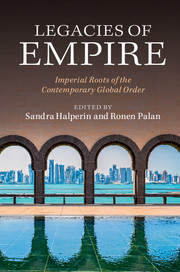Book contents
- Frontmatter
- Contents
- List of figures
- List of tables
- List of contributors
- Acknowledgments
- 1 Introduction: legacies of empire
- Part I Incomplete transitions from empires to nation states
- Part II Legacies of non-European empires in today's world
- Part III The future legacies of the American Empire
- Index
- References
1 - Introduction: legacies of empire
Published online by Cambridge University Press: 05 August 2015
- Frontmatter
- Contents
- List of figures
- List of tables
- List of contributors
- Acknowledgments
- 1 Introduction: legacies of empire
- Part I Incomplete transitions from empires to nation states
- Part II Legacies of non-European empires in today's world
- Part III The future legacies of the American Empire
- Index
- References
Summary
‘Empires and civilizations come and go’, or so it is generally assumed. But what actually happens when imperial powers decline? Do the institutions and logics of empire entirely disappear? A great deal of historical and archaeological evidence suggests that they do not, that they leave their mark on international structures and processes and on the institutions, cultures, politics and legal systems of the peoples who inhabit the territories of their former cores and peripheries. But if empires never entirely disappear, why does it matter? What implications are there for how we understand the contemporary, supposedly ‘post-imperial’, system of national states?
Much has been written about the European colonial empires, largely focusing on relations between imperial powers and their colonies, and the impact of these relations on both. This book examines the phenomenon of empire from a somewhat different perspective. It explores the imprint that empires – their institutions, organisational principles and logics – have left on the modern world. Students of international relations are accustomed to thinking of the contemporary world as post-imperial, as divided among discrete political entities founded on national communities, each jealously guarding its sovereignty and power against the dangers of an anarchic world; facing each other, in Thomas Hobbes’ colourful metaphor, ‘in the state and posture of gladiators … their weapons pointing, and their eyes fixed on one another’ (Hobbes 1951: 79). Yet, the reality is very different.
- Type
- Chapter
- Information
- Legacies of EmpireImperial Roots of the Contemporary Global Order, pp. 1 - 24Publisher: Cambridge University PressPrint publication year: 2015
References
- 1
- Cited by



